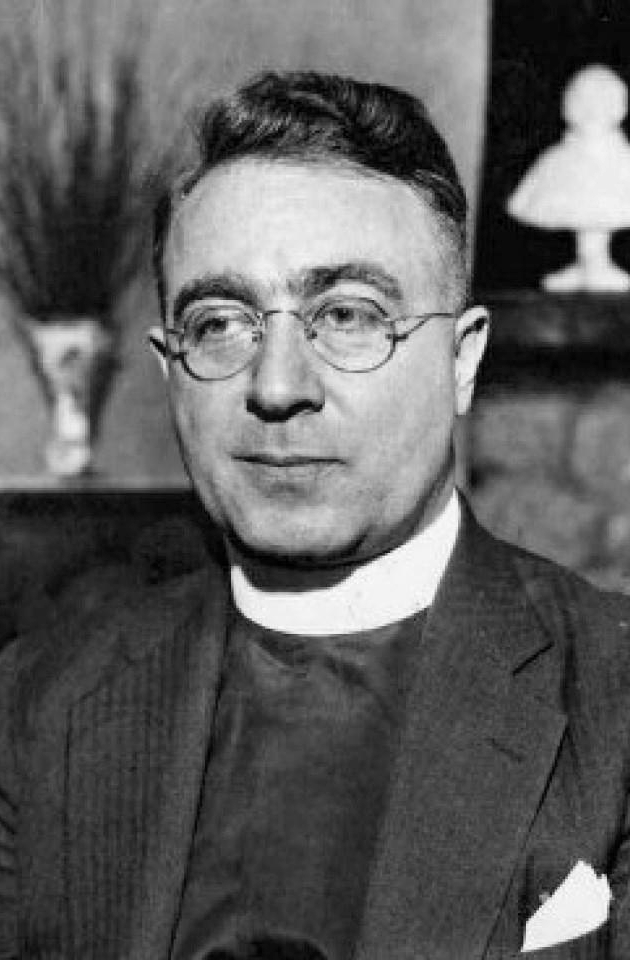Sunday, November 17, 2019
Father Charles E. Coughlin
Charles E. Coughlin, born in 1891, was one of the most influential men in America during the height of his fame. Coughlin became a priest in 1923 despite seriously considering going into politics. He preached out of the Shrine of Little Flower in Detroit for three years before he began to broadcast sermons via the new radio technology. At the beginning of his radio career, Coughlin focused entirely on theological topics and did not discuss politics. However, like many Americans at the time, Coughlin was interested in the nation’s politics and his radio broadcasts became increasingly political. He started off by attacking President Hoover’s policies and voicing his pro-FDR opinion. Coughlin even started using the phrase “Roosevelt or ruin” to emphasize his support for FDR’s administration. However, Coughlin's support for FDR began to wane when he thought that FDR was not harsh enough with Wall Street bankers and capitalists. Coughlin thought that only a radical change in the country would bring the social justice that it required, and the New Deal was not radical enough. As his broadcast gained popularity, Coughlin grew increasingly hostile towards FDR and the New Deal. At the same time, his anti-semitic views started to show, making his broadcast a topic of controversy. He was accused of supporting fascism and eventually, his superior at the Shrine of Little Flower ordered him to stop broadcasting. Additionally, his magazine, Social Justice, was banned from the mail. In 1979, Coughlin died without having achieved any real political success through his views. Coughlin is considered one of the first radio celebrities who used his platform to spread political views. Millions of listeners tuned in to his broadcasts, signifying the popularity of political discussions among Americans at this time.
Subscribe to:
Post Comments (Atom)

I really like how your post was concise, but also very informative in explaining the progression of Coughlin from a popular political advocate for FDR to someone who despised FDR's ideals. It is interesting how as soon as his radio show popularized, he began to express his true views towards FDR. Upon further research, I found that his calm voice was key to his widespread popularity on the radio. As described by writer Wallace Stegner, his voice was one of "such mellow richness, such manly, heart-warming confidential intimacy, such emotional and ingratiating charm, that anyone tuning past it almost automatically returned to hear it again."
ReplyDeletehttps://www.pbs.org/wgbh/americanexperience/features/holocaust-coughlin/
This is a super interesting blog post and I learned a lot from it! Coughlin's story really shows the impact of new technologies, like the radio, on everyday life and even on politics. After reading your post, I decided to look more into the Shrine of the Little Flower because I wasn't completely sure what it was. I found out that it was a Roman Catholic Church in Royal Oak, Michigan which was named after Saint Thérèse de Lisieux (the Little Flower).
ReplyDeletehttps://www.shrinechurch.com/history-of-the-church/
This further emphasizes the common theme during this time period, the pervasiveness of radio and the political talk. I was surprised that his radio and his newspaper were able to be taken down by the government. I realized that, at the time, the federal government controlled radio, so they could also shut down any programs that they wanted. The administration argued against the claim that it violated the First Amendment because radio was a “limited national resource.” Coughlin, realizing this, took to the written press of his newspaper, Social Justice, as you mentioned. However, after the Pearl Harbor bombing, Coughlin was seen as an enemy sympathizer and the administration prevented the postal service from distributing it.
ReplyDeletehttps://encyclopedia.ushmm.org/content/en/article/charles-e-coughlin
I thought this topic was super intresting becuase it combined the contrasting political and social views of the time with the implication of new technology. These attacks on political leaders and contrasting views was typial of the time and coud be seen all throughout history. People alway seemed to have issues with the president and some way that the country was functioning, although before the radio these ideas were only expressed though newspaper. The radio allowed people to more broadly express thier ideas and beliefs. I think this is what made the radio so grealty important at the time.
ReplyDelete